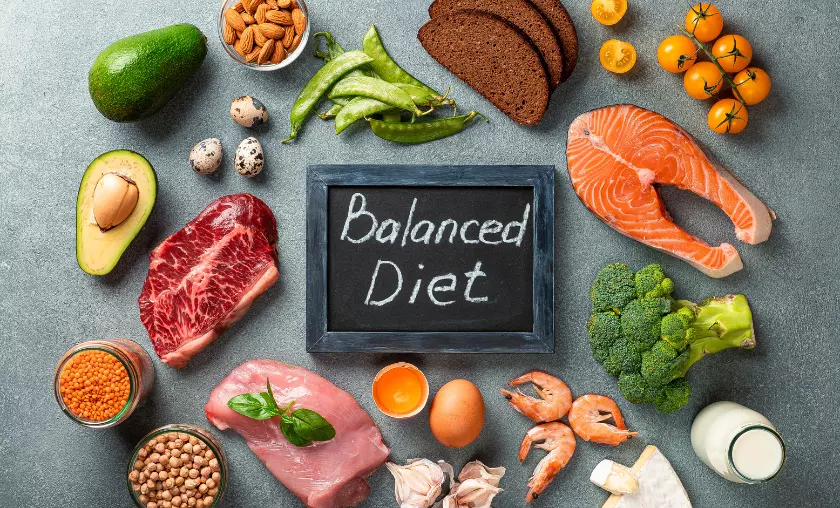In a world where fad diets and quick fixes abound, the timeless principle of healthy eating stands tall as a reliable compass for sustainable weight loss. Welcome to our comprehensive guide on “Healthy Eating for Weight Loss.” Whether you’re taking your first steps towards shedding a few pounds or aiming to revamp your entire approach to nutrition, this article is your roadmap to success.
We’ll unravel the myths, explore the science, and offer practical tips that empower you to make informed food choices. From debunking common misconceptions to embracing the power of balanced meals, join us as we navigate the realms of nourishment and wellness, fostering a healthier lifestyle from the plate up.
Healthy Eating for Weight Loss
Understanding Calories
Understanding calories is crucial in maintaining a balanced approach to nutrition and fitness. Calories represent the energy content of the foods we consume and the energy expended through physical activity. Striking a balance between caloric intake and expenditure is essential for weight management and overall health.
Consuming more calories than your body needs can lead to weight gain, while consistently burning more calories than you consume can lead to weight loss. It’s important to recognize that the quality of calories matters too – choosing nutrient-dense foods ensures you’re nourishing your body with essential vitamins and minerals.
Role of Caloric Intake in Weight Management
By grasping the concept of calories and making informed dietary choices, you empower yourself to create a sustainable and health-conscious relationship with food that supports your fitness goals.
Nutrient Density
Choosing Foods That Pack a Punch
Nutrient density is a guiding principle in making informed dietary choices promoting overall health. Foods with high nutrient density offer a wealth of essential vitamins, minerals, and other beneficial compounds relative to their calorie content.
Opting for nutrient-dense foods means you’re getting more nutritional bang for your buck, as these options provide the necessary fuel for your body’s functions while also supporting optimal well-being. Incorporating a variety of colorful fruits, vegetables, whole grains, lean proteins, and healthy fats into your diet ensures you’re nourishing your body with the essential nutrients it requires.
Benefits of Nutrient Density
Portion Control
Moderation Matters
Practicing portion control is fundamental to maintaining a balanced and health-conscious diet. It involves being mindful of the amount of food you consume, ensuring you’re neither overindulging nor depriving yourself. By paying attention to portion sizes, you can prevent excessive caloric intake that can lead to weight gain and other health issues. Portion control allows you to enjoy a variety of foods while still managing your calorie intake effectively.
Developing an awareness of appropriate portions supports weight management. It promotes a positive relationship with food, encouraging you to savor each bite mindfully and make choices that contribute to your overall well-being.
Benefits of Portion Control
Balanced Meals
The Plate Method
Embracing the plate method for balanced meals is a simple yet effective approach to ensuring a well-rounded and nutritious diet. You create a visual representation that guides your meal composition by mentally dividing your plate into sections. Fill half the plate with a colorful assortment of vegetables and fruits, providing a wealth of vitamins, minerals, and fiber.
One-quarter of the plate can be dedicated to lean proteins like poultry, fish, or legumes, supporting muscle health and satiety. The remaining quarter can be reserved for whole grains or starchy vegetables, which provide sustained energy and essential nutrients. Incorporating a small serving of healthy fats or dairy completes the plate, offering additional nourishment.
Benefits of Balanced Meals
Lean Proteins
The Foundation of Fullness
Lean proteins play a crucial role in promoting a sense of fullness and satiety, making them a fundamental component of a balanced diet. These protein sources, which include options like poultry, fish, tofu, and legumes, provide essential amino acids that support muscle maintenance, repair, and overall bodily functions.
Due to their slower digestion and absorption rate, lean proteins keep you satisfied for longer, helping curb overeating and support weight management. Incorporating lean proteins into your meals also assists in stabilizing blood sugar levels and preventing energy crashes.
Benefits of Lean Proteins
Smart Carbohydrates
Navigating the Carb Landscape
Carbohydrates provide the body with its primary source of energy, but not all carbs are created equal. Opting for complex carbohydrates like whole grains, legumes, and vegetables offers a sustained release of energy, preventing rapid spikes and crashes in blood sugar levels.
These choices also provide essential fiber that aids digestion and promotes a feeling of fullness. On the other hand, refined carbohydrates like sugary snacks and processed foods should be consumed in moderation, as they can lead to energy crashes and disrupt balanced blood sugar levels.
Benefits of Smart Carbohydrates
Healthy Fats
Essential for Satiety
Healthy fats play a crucial role in maintaining a well-rounded and nourishing diet. Contrary to misconceptions, fats are essential to our nutrition and contribute to feelings of satiety and fullness after meals. Incorporating sources like avocados, nuts, seeds, and fatty fish provides your body with essential fatty acids that support overall health, including brain function and cardiovascular health.
These fats also slow digestion, prolonging energy release and promoting a stable blood sugar level. Including healthy fats in your diet enhances the flavor and texture of your meals and contributes to balanced eating habits that promote sustained energy, curbed cravings, and a sense of satisfaction.
Benefits of Healthy Fats
Mindful Eating
Savoring Your Food
Mindful eating is a practice that encourages a deeper connection with your meals by focusing on the present moment and savoring each bite. Refusing meals in a fast-paced world is easy without fully appreciating the experience. Mindful eating invites you to engage your senses, paying attention to your food’s flavors, textures, and aromas.
This practice enhances your enjoyment of meals and promotes better digestion and portion control. By eating slowly and tuning into your body’s hunger and fullness cues, you’re more likely to recognize when you’re satisfied, preventing overeating.
Benefits of Mindful Eating
Hydration & Habits
A Holistic Approach to Weight Loss
Hydration and habits form a holistic weight loss approach beyond calorie counting. Staying adequately hydrated supports various bodily functions and aids in managing appetite. Drinking water before meals can help you feel fuller, potentially reducing overall calorie intake.
Additionally, cultivating healthy habits around eating, exercise, and sleep promotes a balanced lifestyle that supports weight loss efforts. Practicing mindful eating, choosing nutrient-dense foods, and engaging in regular physical activity contribute to long-term success.
Benefits of Hydration & Habits
Conclusion
Adopting a healthy eating regime for weight loss is not just a diet but a transformative lifestyle change. This article has illuminated the importance of nourishing your body with balanced, nutrient-rich foods fueling your journey towards a healthier weight.
Remember, the path to weight loss is unique to each individual, and patience is key. Sustainable results come from making mindful choices, practicing portion control, and embracing various wholesome foods. This journey isn’t just about shedding pounds; it’s about cultivating a positive relationship with food and your body.
As you navigate this path, keep in mind that setbacks are natural—what truly matters is your commitment to progress and well-being. So, let your choices reflect your aspirations, and let this be the beginning of a vibrant, health-driven chapter in your life.
FAQ’s
How Often Should I Work Out as a Beginner?
Starting with 3-4 days a week is a good approach. Allow your body time to recover between sessions to prevent overexertion and injury.
Can I Start Working Out if I’m Not in Good Shape?
Absolutely. Begin with low-intensity exercises like walking or light cardio. Gradually increase intensity as your fitness level improves.
How Long Should My Workouts Be?
Starting with 20-30 minutes is effective. Focus on quality over quantity; gradually extend your workouts as your endurance builds.
What’s the Role of Rest in a Fitness Routine?
Rest days are vital for recovery and muscle growth. Overworking can lead to burnout and hinder progress. Listen to your body’s signals.
What if I Don’t Like Traditional Exercise?
Explore non-traditional options like dancing, swimming, or hiking. The goal is to find activities you enjoy, ensuring consistency.
To Read More Similar Articles, Click Here.
Thanks for Visiting Our Website. If You Appreciate Our Work, Kindly Show Us Some Support in Our Comments Section 🙂



